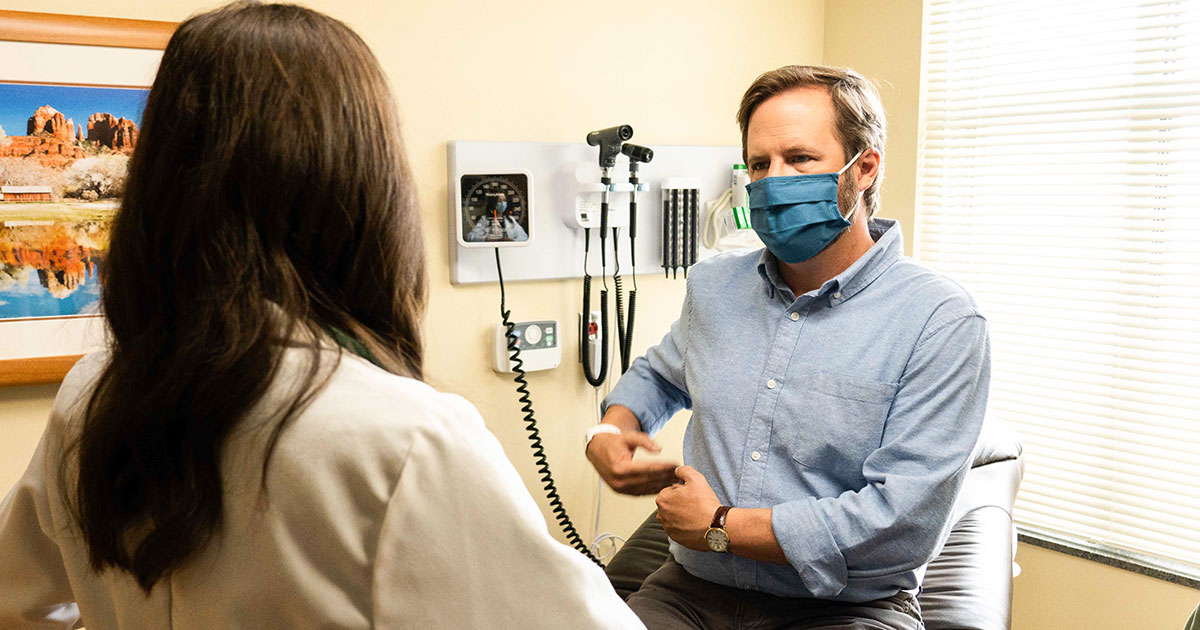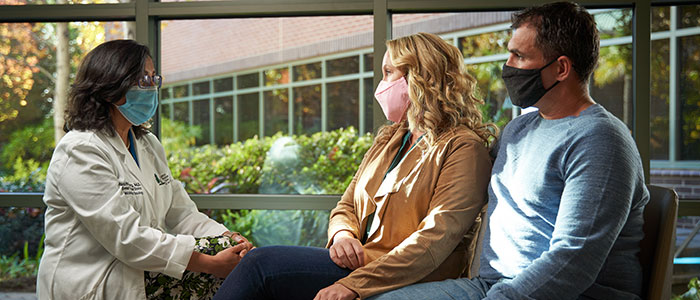
Sharing doesn’t always mean caring, and some secrets, no matter how seemingly minor, may be best kept under wraps. No one needs to know how often you wash your sheets or that you secretly watch cheesy Christmas movies when you’re alone.
When it comes to your health, however, sharing is caring (about yourself), and there's no such thing as too much information. Doctors need to know what you’re experiencing, if you have any symptoms—no matter how gross—and if they’re getting worse.
That’s especially true with potential cancer symptoms. Identifying cancer symptoms early often results in more available and less invasive treatment options and stronger outcomes. Ignoring symptoms too long may lead to detecting the disease in advanced stages, which may pose more treatment challenges. In fact, most cancer deaths have been attributed to metastasis, when the cancer has spread beyond the primary tumor.
Patients, however, are tight lipped when it comes to revealing symptoms they may consider embarrassing. Who wants to talk about blood in the stool or an unusual fluid discharge? And they may be concerned about the eventual diagnosis or the associated diagnostic poking and prodding that may result from revealing symptoms.
“There are lots of reasons why people delay care,” says Anthony Perre, MD, Intake Physician at City of Hope Atlanta. “Being frightened is certainly one of them.”
But indications from a United Kingdom study suggest it’s more than fear driving the aversion. A 2019 survey by the British health care group BUPA, found that 35 percent of Brits put off getting bowel cancer symptoms checked because they’re embarrassed.
“It’s key that we normalize conversations about bowel movements and poo in order for people to stop feeling embarrassed and come forward if they’re experiencing symptoms,” Dr Diana Tait, Clinical Oncologist at BUPA’s Cromwell Hospital, said in the survey report. “If you notice any blood in your poo, changes to your bowel movement, bloating or abdominal pain after eating, see your [doctor] as soon as possible. Don’t put it off—early diagnosis really does save lives.”
In this article, we’ll explore:
- Why people may ignore potential symptoms
- Cancer symptoms people may find embarrassing
- Cancers that may cause embarrassing symptoms
- Why early diagnosis is key
If you’ve been diagnosed with cancer and want to get a second opinion about your diagnosis or treatment options, call us or chat online with a member of our team.
Why people may ignore potential symptoms
Disease symptoms may go unaddressed for a combination of reasons. In a 2010 survey conducted in the United Kingdom, respondents said they didn’t visit the doctor after experiencing a potential cancer symptom because they:
- Didn’t know which doctor to see
- Could take care of it themselves
- Didn’t have time
- Thought the symptoms would go away
- Couldn’t find a doctor or were awaiting an appointment
- Thought they were being silly
In the United States, many people in rural areas, in Native American communities and some urban neighborhoods may delay getting checked because they may not have a primary care physician or ready access to a doctor or clinic. Also, many people who don’t have insurance may also be concerned about the costs of a doctor’s visit, tests and treatments.
“Sometimes, it's as simple as time and access to health care,” Dr. Perre says. “And there's a number of people, especially during the pandemic, who want to avoid going into the doctor’s office.”
Many people aren’t aware of common cancer symptoms or don’t regularly screen themselves for early signs of the disease. For instance, a survey by the testicular cancer advocacy group CACTI (Center for Advocacy for Cancer of the Testes International) found that about 45 percent of men never or rarely examine themselves for testicular cancer. And nearly half of all men didn't know the importance of a self-examination or didn't take the notion of one seriously.
"It's detectable if someone is doing a self-exam," says Farshid Sadeghi, MD, Urologic Oncologist and Medical Director of the Genitourinary Center at City of Hope Phoenix. "But it may be detected at a more advanced stage if young men never check themselves.”
Cancer symptoms people may find embarrassing
Cancer may cause many symptoms that are hard to ignore. Pain, difficulty swallowing or breathing and unexplained weight loss may be difficult to dismiss, especially if they interfere with quality of life or are noticed by loved ones.
But many cancer symptoms may only be seen or felt under clothing, in the bathroom or otherwise behind closed doors, including:
- Blood in the stool
- Blood in the urine
- Vaginal discharge
- Nipple discharge
- Difficulty urinating
- Breast changes or lumps
- A lump on the penis or testes
“These can be embarrassing symptoms, for sure,” Dr. Perre says. “And sometimes, we see people who delayed care because they have some level of embarrassment. It's human nature to kind of downplay symptoms. Take rectal bleeding, for instance. Many people who I've seen thought perhaps that it was just related to something simple, like a hemorrhoid, and they didn't want to go to the doctor to get an invasive examination or a rectal examination.”
Cancers that may cause embarrassing symptoms
Cancers that may cause embarrassing symptoms include those below.
Gynecologic cancers, including vaginal cancer and vulvar cancer
Common symptoms include:
- Vaginal discharge
- Abnormal vaginal bleeding
- Pain during sex
- Bloating or swelling in the abdomen or legs
Genitourinary cancers in men, including prostate cancer, bladder cancer, penile cancer and testicular cancer
Common symptoms include:
- Lump on the penis or either teste
- Pain, swelling or heaviness in the scrotum
- Dull pain in the abdomen
- Blood in urine
Digestive cancers, including colorectal cancer, anal cancer and stomach cancer
Common symptoms include:
- Persistent heartburn or indigestion
- Changes in bowel habits
- Blood in the stool
- Diarrhea or constipation
Breast cancer in men and women
- Lump in the breast or armpit
- Nipple discharge
- Changes to the breast skin
- Painful or sensitive breasts

See a doctor for every cancer symptom
Cancer symptoms can run the gamut, from bleeding, discharges or secretions to fatigue, weight loss or weight gain. And not every symptom listed as a potential sign of cancer means you have cancer.
Fatigue may be caused by an infection, anemia or simply lack of sleep. Weight loss may result from an overactive thyroid or a digestive condition. And while common symptoms of cancer may be caused by a benign condition, they may also signal other serious conditions such as diabetes or autoimmune diseases.
Men, especially, are more likely to ignore symptoms and their overall health. A 2019 Cleveland Clinic survey showed that 72 percent of men would rather do household chores, go shopping or “do almost anything to avoid going to the doctor.”
“With men, you may find out that they went for a sports physical and felt OK, so they haven’t gone to the doctor for maybe 10 years.” Dr. Sadeghi says. “They’re not getting routine exams. It’s not part of their culture.
“A man sees a lesion on his penis, but he doesn’t get it checked by a doctor because it doesn’t cause any pain or other issues. But the problem is, it goes from something we can just trim off to losing the penis. And when you ask why he didn’t go to the doctor, the response is often: ‘Well, it didn’t hurt.’”
Research in Sweden found that 65 percent of men delayed having a doctor check a lesion on their penis for more than six months. The most common excuse given was a “feeling of embarrassment.”
Men’s breast cancer is very rare, yet men may have poorer outcomes than women, in part because they delay getting symptoms checked and often are diagnosed at more advanced stages. According to a report published in 2018, titled in part, “Men With a ‘Woman’s Disease,’” many male breast cancer patients felt stigmatized and shamed for having breast cancer.
Women, too, may not want to reveal issues with their reproductive system, the British advocacy cancer group The Eve Appeal found in a recent study. More than one in 10 16- to 35-year-olds said “they found it very hard to talk to their [doctors] about gynecological health concerns,” the group found. “And nearly a third admitted that they had avoided going to the doctors altogether with gynecological issues due to embarrassment.”
But your doctor can’t help you or identify the source of your symptoms without your help. So, it’s best to be honest with yourself and your doctor and work together to pinpoint your health issues.
The National Institute on Aging offers these tips on getting the most out of your doctor visit:
Write down the most important questions you want to ask your doctor, and get to as many as time allows.
Focus on the reason for your visit. Explain your symptoms, when they started and whether they’re getting worse.
Be honest with your doctor about your eating and drinking habits, your exercise and activity, sexual history and other relevant information.
Find another doctor if your current physician does not seem to be addressing your issues or brushes off your questions or concerns.
“It’s important to try to establish a relationship with a primary care doctor, if you can,” Dr. Perre says. “As you develop a relationship with a doctor over time, you may become much more comfortable talking about some of these symptoms, should they arise.”
Why early diagnosis is key
Cancer doesn’t wait for you to feel more comfortable talking about symptoms you may be experiencing. While you’re weighing whether to go to the doctor, your early-stage cancer may spread and become an advanced-stage cancer that’s more difficult to treat. Delaying care may allow cancer a chance to metastasize or spread from its origin to other parts of the body.
Cancer survival rates by type
The chart below shows the five-year survival rates for the five most common cancers when the disease is in one of the stages listed.
Localized means before it’s spread from its primary source.
Regionalized means the cancer has spread to nearby tissue or lymph nodes.
Metastasized means it’s spread to distant organs.
| Cancer type | when localized |
when regionalized |
when metastasized |
|---|---|---|---|
| Breast | |||
| Colorectal | |||
| Lung | |||
| Prostate | |||
| Melanoma |
Source: National Cancer Institute Surveillance, Epidemiology, and End Results (SEER) Program
Cancers most commonly spread to the bone, brain, liver and lungs.
Dr. Perre urges people with unusual or embarrassing symptoms to see their doctor and be candid about their concerns. Better yet, patients at high risk of developing cancer should talk to their doctor about regular screenings that may detect issues before symptoms develop.
“You should talk to your doctor about any symptom that is new to you or has not changed,” he says. “And just because a symptom may have gone away or resolved itself doesn’t mean everything is OK. So, talk to your doctor about that as well.”
If you’ve been diagnosed with cancer and want to get a second opinion about your diagnosis or treatment options, call us or chat online with a member of our team.
